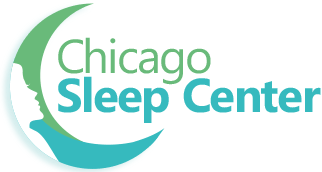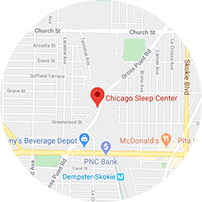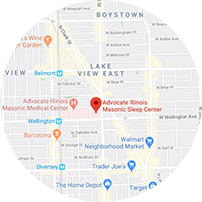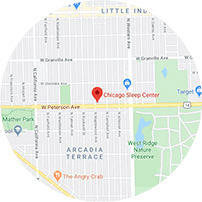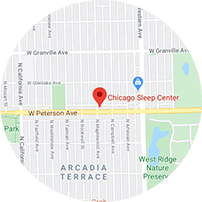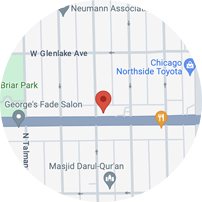Insomnia in Chicago
Do you suspect that you may have a sleep disorder? You may wake up after a whole night’s sleep still feeling exhausted, or your partner may complain that you thrash about in the middle of the night.
These are only a few signs that can accompany something like insomnia, parasomnias, and hypersomnias. At Chicago Sleep Center, our sleep specialists and doctors are dedicated to improving your sleep and health.
What is Insomnia?
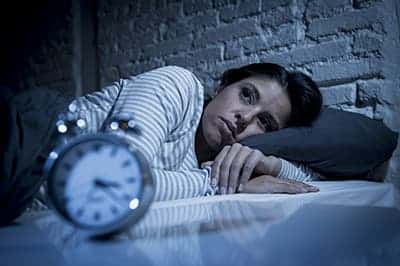 Insomnia occurs when you’re unable to fall asleep, remain asleep, or both. Insomnia itself isn’t a sleeping disorder.
Insomnia occurs when you’re unable to fall asleep, remain asleep, or both. Insomnia itself isn’t a sleeping disorder.
Instead, it’s a symptom of something else, like stress or a physical or psychological condition. It can also be a symptom of another sleeping disorder, like sleep apnea. It may also be a symptom of parasomnia.
Common Causes
- Sleep apnea is a condition that occurs when a sleeping person’s breathing is interrupted, thus interrupting the normal sleep cycle. With the obstructive form of the condition, some part of the sleeper’s respiratory tract loses muscle tone and partially collapses. People with obstructive sleep apnea often do not remember any of this, but they complain of excessive sleepiness during the day. Central sleep apnea interrupts the normal breathing stimulus of the central nervous system, and the individual must actually wake up to resume breathing. This form of apnea is often related to a cerebral vascular condition, congestive heart failure, and premature aging.
- Jet lag is seen in people who travel through multiple time zones on a regular basis, as the time relative to the rising and falling of the sun no longer coincides with the body’s internal concept of it, and is also seen in people who consistently work night shifts. See also: the circadian rhythm.
- Parasomnia includes a number of disorders of arousal or disruptive sleep events including nightmares, sleepwalking, violent behavior while sleeping, and REM behavior disorder, in which a person moves his/her physical body in response to events within his/her dreams. These conditions can often be treated successfully through medical intervention or through the use of a sleep specialist.
- Gastroesophageal Reflux Disease causes repeated awakenings during the night due to unpleasant sensations resulting from stomach acid flowing up into the throat while asleep.
- Mania or Hypomania in bipolar disorder can cause difficulty falling asleep. A person going through a manic or hypomanic episode may feel a reduced need for sleep. Sleep deprivation can worsen a manic episode or cause hypomania to develop into mania.
Hypersomnia
What are Hypersomnias?
 Hypersomnias are a category of sleeping disorders that involve excessive sleepiness during the day. If someone has a confirmed case of hypersomnia, there’s no identifiable cause.
Hypersomnias are a category of sleeping disorders that involve excessive sleepiness during the day. If someone has a confirmed case of hypersomnia, there’s no identifiable cause.
A person will not experience disturbed sleep or sleep deprivation but will remain tired and fall asleep very easily during the day. Hypersomnia can last for months, in which case it’s called idiopathic hypersomnia, or if it happens in isolated episodes, it’s called recurrent hypersomnia.
How Are Sleep Disorders Diagnosed?
Parasomnias are diagnosed with an overnight sleep study. An overnight sleep study, also called polysomnography, involves monitoring patients in a sleep center. While being watched, they are also hooked up to various instruments that record their brain activity, body movement, heart rate, breathing, and oxygen saturation.
Hypersomnias are diagnosed with an overnight sleep study, and additional daytime sleep studies called multiple sleep latency tests (MSLT). These tests are designed to measure how quickly you fall asleep during the day.
MSLT can be used to diagnose both hypersomnias and narcolepsy, which is not a sleeping disorder but rather a neurological condition. MSLT is useful in determining whether a person is experiencing true hypersomnia or if they may be narcoleptic.
Chicago Sleep Center offers polysomnography and MSLT to diagnose hypersomnias and parasomnias. We will recommend treatment based on the diagnosis.
How are Sleep Disorders Treated?
Sleeping disorder treatment varies depending on the condition. If there’s an underlying cause, as is often the case when a person experiences insomnia or has been diagnosed with a parasomnia, that cause is addressed first.
Patients with sleep apnea often find that any co-current parasomnias like night terrors and limb movement are also reduced when their sleep apnea is managed. If no underlying cause is identifiable, as is often the case for hypersomnia, the best treatment is medication or behavior modification.
Drugs that treat narcolepsy may prove effective for patients with idiopathic or recurrent hypersomnia. Behavior modification often involves maintaining a regular sleep schedule and practicing good sleep hygiene.
A cognitive behavior therapist may be able to help you modify your sleeping habits to improve your condition. Therapy to address specific psychological triggers for certain parasomnias, like night terrors, may also prove effective.
But sleeping disorders often require a holistic treatment plan, so an individual treatment may not work independently. Our sleep specialists at Chicago Sleep Center can work with you to develop a treatment plan based on your unique needs and refer you to recommended therapists.
Ready to get to the bottom of your poor sleeping habits? Schedule an appointment at Chicago Sleep Center in Chicago, IL, to take control of your sleep!
Daytime Sleep Studies for Hypersomnias
While sleep studies are often recognized as taking place throughout the evening, multiple sleep latency tests (MSLT) take place during the day. MSLT test excessive daytime sleepiness by measuring how quickly one falls asleep in a quiet environment during the day. This is a standard tool used to diagnose narcolepsy and idiopathic hypersomnia.
Parasomnia
What are Parasomnias?
Parasomnias are a category of sleep disorders where sleep is disturbed by abnormal body movements, dreams, or intense emotional states while you’re sleeping or you’re in between the stages of sleep. This includes sleepwalking, night terrors, periodic limb movement disorder, and restless leg syndrome.
Limb movements characterize these last two conditions during sleep that may disturb the sleeper, a person who shares a bed with the sleeper, or both.
Night Terrors
What are Night Terrors?
Night terrors are a parasomnia. A parasomnia is a kind of sleeping disorder characterized by undesirable occurrences while sleeping, between stages of sleep, or between being awake and asleep.
Night terrors happen when a person is asleep and experiences intense fear, leading to screaming and flailing. The person experiencing these night terrors remains asleep and often cannot be consoled or woken up.
Night terrors are especially common in children, with around 40% of children experiencing occasional night terrors. Night terrors are less common in adults.
On occasion, they can still occur when triggered by sleep deprivation, stress, mood disorders, or other sleeping disorders like obstructive sleep apnea. People who experience night terrors are also prone to sleepwalking.
Why Do People Sleepwalk?
Sleepwalking is also a parasomnia and is referred to medically as somnambulism. Sleepwalking may occur along with night terrors as a person experiencing a night terror might get out of bed and even try to escape their room or house.
While this is rare, it’s still common for people who experience night terrors to sleepwalk occasionally. Sleepwalking is also more common in children than adults.
Usually, sleepwalking means walking and performing other simple tasks while asleep. While sleepwalking, most people usually won’t do anything dangerous or extreme.
Still, there are cases where someone leaves their home, drives a car, or becomes violent due to confusion while sleeping or waking up while sleepwalking. However, it’s generally best to wake a person while they’re sleepwalking, as continued sleepwalking is usually more of a risk for them than waking them.
Somnambulism tends not to be triggered by underlying psychological causes, but sleep deprivation and potent sedatives can trigger it. It often runs in families. Stress, fever, restless leg syndrome, sleep apnea, and even gastroesophageal reflux disease (GERD) can also trigger sleepwalking.
When Should You Seek Help for Night Terrors or Sleep Walking?
In children, occasional sleepwalking and night terrors are nothing to be alarmed over. But if their night terrors become more frequent and begin regularly disrupting either their sleep or the sleep of other household members, or if their symptoms are violent enough to warrant safety concerns, you should seek the help of a sleep specialist.
Night terrors that persist into adulthood or begin in adulthood should also be seen by a medical professional. Isolated sleepwalking incidents as a child are also normal, but frequent sleepwalking may be caused by an underlying sleeping disorder that needs treatment.
If sleepwalking episodes put the sleeper or others in danger, they should also be seen by a specialist so safety measures can be put into place.
What are the Risks of Night Terrors and Sleepwalking?
Both sleepwalking and night terrors can cause excessive tiredness during the day because of disturbed sleep. Both can also lead to injury of themself or others.
A common concern of people who experience regular night terrors and share a bed with someone is accidentally injuring their partner while flailing during a night terror. Even if your sleepwalking or night terrors are relatively mild and don’t put yourself or others at risk for injury, experiencing episodes frequently is still a concern that you should address.
At the very least, seeing a sleep specialist can help you develop better sleep hygiene, leading to a better night’s sleep. You may even be able to stop sleepwalking or experiencing night terrors entirely!
How are Night Terrors and Sleepwalking Treated?
The first step in treating any disorder is to get a diagnosis. To get a diagnosis for night terrors or sleepwalking, you’ll need to undergo a complete, in-lab sleep study, also called polysomnography.
You or your child will sleep in a dedicated facility while hooked up to instruments measuring your heart rate, breathing, oxygen saturation, limb movements, and brain activity. This study gives your Chicago Sleep Center sleep specialist the ability to assess your symptoms and make an informed diagnosis.
At Chicago Sleep Center, we provide in-lab sleep studies for both children and adults. After our specialists make a diagnosis, treatment varies based on the findings of the sleep study.
If there are any underlying causes, like disrupted breathing during sleep, those are treated first. For patients with sleep apnea, treating their apnea with a CPAP machine often leads to better sleep, along with fewer night terrors and sleepwalking episodes.
For some patients, this is enough to treat these sleep issues. For others, they may need further treatment.
Parasomnias, in general, are also often treated with behavior modification, which is best addressed by using cognitive behavior therapy. Our sleep specialists can refer you to a therapist who can help you deal with stress and work through solutions by changing your sleeping habits.
Sometimes, self-hypnosis can be an effective treatment and can also be taught by a therapist. In rare cases, medications like benzodiazepines, which are mild sedatives, can also be used for temporary relief while going to therapy.
Other antidepressants may be part of a long-term solution. It may take a combination of medications, therapy, and other treatments to find the solution you need.
Each case is different, and your sleep specialist will work with you to help you manage your condition. But the first step is a comprehensive sleep study and diagnosis.
From this point, you and your Chicago Sleep Center doctor will work together to determine the right treatment plan for you. It may seem scary to treat these sleep disorders but know that getting treatment is the only way to get back to having a good night’s sleep.
Ready to find out what’s causing your night terrors and sleepwalking episodes? Schedule an appointment at Chicago Sleep Center in Chicago, IL, and make getting a restful night’s sleep a top priority!

